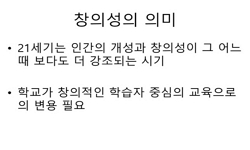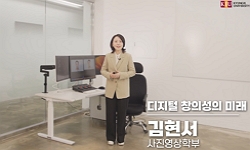Creativity as a cognitive factor, interpersonal relationship skills as an affective factor and the creative family environment as an environmental factor were selected to prove the structural relationships with creative leadership of 408 5th and 6th g...
http://chineseinput.net/에서 pinyin(병음)방식으로 중국어를 변환할 수 있습니다.
변환된 중국어를 복사하여 사용하시면 됩니다.
- 中文 을 입력하시려면 zhongwen을 입력하시고 space를누르시면됩니다.
- 北京 을 입력하시려면 beijing을 입력하시고 space를 누르시면 됩니다.

초등학생의 창의적 가정환경, 창의성, 자기조절능력, 대인관계형성능력과 창의적 리더십의 구조적 관계 = Structural Equation Model of Creative Home Environment, Creativity, Self-Regulation, Interpersonal Relationship Skills and Creative Leadership of Elementary School Students
한글로보기https://www.riss.kr/link?id=A106620813
- 저자
- 발행기관
- 학술지명
- 권호사항
-
발행연도
2020
-
작성언어
-
- 주제어
-
KDC
373
-
등재정보
KCI등재
-
자료형태
학술저널
-
수록면
1037-1062(26쪽)
-
KCI 피인용횟수
0
- DOI식별코드
- 제공처
-
0
상세조회 -
0
다운로드
부가정보
다국어 초록 (Multilingual Abstract)
Creativity as a cognitive factor, interpersonal relationship skills as an affective factor and the creative family environment as an environmental factor were selected to prove the structural relationships with creative leadership of 408 5th and 6th grade students. We looked at how cognitive, affective, and environmental factors affected creative leadership of elementary school students. The results of the study were as follows: First, creativity, self-regulation ability, and interpersonal relationship skills had significant direct effects on the creative leaderships in the structural relationship of creative home environment, creativity, self-regulation ability, interpersonal relationship formation ability, and creative leadership. Second, self-regulation ability had the greatest effect on creative leadership among potential variables. Third, the creative home environment did not have a direct effect on creative leadership, but there was an indirect effect as a mediator, and the total effect was next to self-regulation ability and creativity. Based on these findings, the implications for teachers and parents were suggested to develop creative leadership of elementary school students.
국문 초록 (Abstract)
초등학생의 창의적 리더십은 인지적 요인, 정의적 요인, 환경적 요인으로부터 모두영향을 받는다는 관점으로 인지적 요인으로서 창의성, 정의적 요인은 대인관계형성능력, 자기조절능력, ...
초등학생의 창의적 리더십은 인지적 요인, 정의적 요인, 환경적 요인으로부터 모두영향을 받는다는 관점으로 인지적 요인으로서 창의성, 정의적 요인은 대인관계형성능력, 자기조절능력, 환경적 요인으로 창의적 가정환경을 선정하여 초등학교 5,6학년 학생 408명을 대상으로 창의적 리더십과의 구조적 관계를 검증하였다. 연구 결과 첫째, 창의적 가정환경, 창의성, 자기조절능력, 대인관계형성능력, 창의적 리더십의 구조적 관계에서 창의성, 자기조절능력, 대인관계형성능력은 창의적 리더십에 유의한 직접효과가 있었다. 둘째, 잠재변인 중 자기조절능력이 창의적 리더십에 미치는 효과가 가장 컸다. 셋째, 창의적 가정환경은 창의적 리더십에 직접 효과는 유의하지 않았으나, 매개변인으로서 간접효과가 있었으며, 총 효과에서는 자기조절능력과 창의성 다음으로 그 효과가 큰 것으로 나타났다. 이러한 연구 결과를 바탕으로 초등학생의 창의적 리더십을 계발하기 위해 교사와 부모들에게 줄 시사점을 제시하였다.
목차 (Table of Contents)
- Ⅰ. 서 론 Ⅱ. 연구방법 Ⅲ. 연구결과 Ⅳ. 논의 및 결론 참고문헌
- Ⅰ. 서 론 Ⅱ. 연구방법 Ⅲ. 연구결과 Ⅳ. 논의 및 결론 참고문헌
참고문헌 (Reference)
1 이경화, "효과적인 교수-학습을 위한 교육심리학" 교육과학사 2009
2 허정경, "학령기 아동의 자기조절능력 척도 개발과 관련 변인 연구" 숙명여자대학교 대학원 2004
3 박병기, "통합창의성이 내재된 다차원 창의적 환경 척도(ICEMCEs)의 개발 및 타당화" 한국교육심리학회 23 (23): 839-862, 2009
4 신은정, "초등학생의 대인관계능력 함양을 위한 도덕교육방안 연구" 서울교육대학교 교육대학원 2011
5 이애리, "초등학생의 기칠, 내현적 자기애, 부모 애착, 사회적 지지와 완벽주의 성향의 구조적 관계" 순천향대학교 대학원 2019
6 유주은, "창의적 성향에 따른 초등학생의 창의적 문제해결에 대한 사례연구" 서울교육대학교 교육대학원 2012
7 최동규, "창의적 리더십, 교사핵심역량, 교사효능감, 학교조직효과성 간의 구조적 관계 분석" 부경대학교 대학원 2018
8 노영희, "창의적 가정환경이 유아의 창의적 리더십에 미치는 영향" 한국어린이미디어학회 14 (14): 453-473, 2015
9 김경민, "창의적 가정환경 척도개발 연구" 고려대학교 대학원 2017
10 김혜숙, "창의성 구조 모형의 검증" 한국교육심리학회 16 (16): 229-245, 2002
1 이경화, "효과적인 교수-학습을 위한 교육심리학" 교육과학사 2009
2 허정경, "학령기 아동의 자기조절능력 척도 개발과 관련 변인 연구" 숙명여자대학교 대학원 2004
3 박병기, "통합창의성이 내재된 다차원 창의적 환경 척도(ICEMCEs)의 개발 및 타당화" 한국교육심리학회 23 (23): 839-862, 2009
4 신은정, "초등학생의 대인관계능력 함양을 위한 도덕교육방안 연구" 서울교육대학교 교육대학원 2011
5 이애리, "초등학생의 기칠, 내현적 자기애, 부모 애착, 사회적 지지와 완벽주의 성향의 구조적 관계" 순천향대학교 대학원 2019
6 유주은, "창의적 성향에 따른 초등학생의 창의적 문제해결에 대한 사례연구" 서울교육대학교 교육대학원 2012
7 최동규, "창의적 리더십, 교사핵심역량, 교사효능감, 학교조직효과성 간의 구조적 관계 분석" 부경대학교 대학원 2018
8 노영희, "창의적 가정환경이 유아의 창의적 리더십에 미치는 영향" 한국어린이미디어학회 14 (14): 453-473, 2015
9 김경민, "창의적 가정환경 척도개발 연구" 고려대학교 대학원 2017
10 김혜숙, "창의성 구조 모형의 검증" 한국교육심리학회 16 (16): 229-245, 2002
11 박유선, "지역사회 연계 초등학교 문화예술교육프로그램에 관한 연구 - 기초조형요소 습득을 중심으로 -" 한국일러스아트학회 19 (19): 149-158, 2016
12 임제현, "조직유형에 따라 조직문화, 창의적 리더십, 자아개념이 창의적 문제해결력에 미치는 영향" 숭실대학교 대학원 2016
13 정은이, "일상적 창의성의 성격 요인과 개별성-관계성과의 관계" 한국심리학회 25 (25): 89-104, 2006
14 최혜진, "유아의 창의적 성향과 자기조절능력이 창의적 리더십에 미치는 영향" 한국열린유아교육학회 20 (20): 529-551, 2015
15 김영선, "유아의 창의적 리더십과 개인지능 간의 관계" 숭실대학교 교육대학원 2012
16 김선영, "유아의 창의적 리더십 관련 변인에 관한 구조 분석" 한국생태유아교육학회 13 (13): 213-237, 2014
17 최혜진, "유아의 자기조절능력과 공감능력이 대인관계형성능력에 미치는 영향: 공감능력의 매개효과" 한국열린유아교육학회 20 (20): 323-345, 2015
18 황윤세, "유아의 리더십에 영향을 미치는 관련 변인의 인과모형 분석" 한국영유아교원교육학회 14 (14): 5-26, 2010
19 김민영, "유아의 리더십과 정서조절능력 및 대인관계형성능력의 관계" 원광대학교 대학원 2013
20 김민영, "유아의 다중지능, 창의적 가정환경 및 사회인구학적 변인이 유아의 리더십에 미치는 영향" 한국보육지원학회 7 (7): 259-284, 2011
21 이경화, "유아 창의적 리더십 측정도구 개발" 한국교육방법학회 22 (22): 135-161, 2010
22 정유정, "유아 셀프 리더십 프로그램 개발 및 적용 효과" 원광대학교 대학원 2008
23 우종필, "우종필 교수의 구조방정식모델 개념과 이해" 한나래출판사 2012
24 김정연, "온라인 창의수업이 대학생의 창의성 및 창의적 리더십 향상에 미치는 효과" 교육종합연구원 13 (13): 1-31, 2015
25 박은미, "아동기 학대 및 지각된 부모의 양육태도가 성인기 대인관계에 미치는 영향에 관한 연구 : 초기 성인기의 친밀한 대인관계의 질을 중심으로" 延世大學校 大學院 1999
26 최윤주, "성인학습자의 창의적 리더십 교육모형 개발" 숭실대학교 대학원 2014
27 성소연, "대학생의 창의적 환경 및 창의적 리더십과 창의적 문제해결력 간의 관계" 한국영재교육학회 16 (16): 111-130, 2018
28 홍세희, "구조방정식 모형의 다양한 모형" 에스앤엠 리서치 그룹 2011
29 교육부, "교육부 고시 제2015-80호. 2 : 초등학교 교육과정 / 교육부 [편]"
30 권낙원, "교육과정" 동문사 2011
31 安凡熙, "對人關係 適切性과 性向檢査의 妥當度 硏究" 연세대학교 대학원 1985
32 Torrance, E. P., "Toward the more human education of gifted children" 7 (7): 135-145, 1963
33 Amabile, T. M., "The social psychology of creativity : A componential conceptualization" 45 (45): 357-, 1983
34 Linver, M. R., "The home observation for measurement of the environment (HOME) inventory: The derivation of conceptually designed subscales" 4 (4): 99-114, 2004
35 Csikszentmihalyi, M., "The future of leadership: Today’s top leadership thinkers speak to tomorrow’s leaders" Jossey-Bass 116-124, 2001
36 Conger, J. A., "The empowerment process : Integrating theory and practice" 13 (13): 471-482, 1988
37 Bronson, M. B., "Self-regulation in early childhood: Nature and Nurture" The Guilford Press 2000
38 Kopp, C. B., "Regulation of distress and negative emotions; A developmental view" 25 (25): 343-354, 1982
39 Perry, N. E., "Promoting nonviolent behavior in children" 16 (16): 26-29, 2001
40 Henderson, S, J., "Product Inventors and creativity : The finer Dimensions of Enjoyment" 16 (16): 293-312, 2004
41 Gardner, H., "Multiple Intelligences: New horizons" Basic Books 2006
42 Van de Ven, A. H., "Measuring and assessing organization" Wiley 1980
43 Amabile, T. M., "Leader behaviors and the work environment for creativity : Perceived leader support" 15 (15): 5-32, 2004
44 하주현, "KEDI 창의적 인성검사 3종 개발 보고서" 한국교육개발원 2011
45 Sisk, D. A., "International handbook of research and development of gifedness and talent" Pergamon 491-505, 1993
46 Torrance, E. P., "Hemisphericity and thinking creativity functioning" 15 (15): 29-37, 1982
47 Csikszentmihaly, M., "Handbook of creativity" Cambridge University Press 313-335, 1999
48 Amabile, T. M., "Frontiers of creativity research: Beyond the basics" Bearly Limited 223-254, 1987
49 Robinson, J. R., "Family environment and creativity in fashion design students" 6 (6): 200-209, 2013
50 Tannenbaum, R. S., "Education or training : reflections on a life in computing" 34 (34): 10-14, 1999
51 Karnes, F. A., "Developing leadership in gifted youth" Office of Educational Research and Imp rovement 1990
52 신권익, "D.I.E.를 활용한 교육연극 프로그램이 초등학생의 창의적 리더십에 미치는 효과" 초등교육연구원 26 (26): 279-299, 2015
53 LaFreniere, P. J., "Cross-cultural analysis of social competence and behavior problems in preschoolers" 13 (13): 201-219, 2002
54 Davis, G. A., "Creativity is Forever" Kendall/hunt 10-, 1999
55 Amabile, T. M., "Creativity in context: Update to the social psychology of creativity" Westview 1996
56 Bleedorn, B. D., "Creativity : Number one leadership talent for the future" 20 (20): 276-282, 1986
57 Puccio, G. J., "Creative Leadership" Sage 2010
58 이지희, "CBAE에 기초한 신라문화예술 프로그램이 아동의 자아존중감과 창의적 리더십에 미치는 영향 -『동궁과 월지』를 중심으로-" 한국조형교육학회 (65) : 185-208, 2018
59 Amabile, T. M., "Article in Harvard business review" 76 (76): 76-87, 1998
60 Sternberg, R. J., "An investment theory of creativity and its development" 34 (34): 1-31, 1991
61 배병렬, "Amos 24 구조방정식모델링" 청람 2017
62 Sternberg, R. J., "A Propulsion Model of Creative Leadership" 13 (13): 145-153, 2004
동일학술지(권/호) 다른 논문
-
유아교사의 다차원적 완벽주의 성향 및 직무스트레스와 프로그램의 질과의 관계 : 심리적 소진의 매개효과를 중심으로
- 학습자중심교과교육학회
- 김안나(Kim an na)
- 2020
- KCI등재
-
키워드 네트워크 분석을 활용한 유아수학에 대한 연구동향 분석
- 학습자중심교과교육학회
- 김유정(Youjung, Kim)
- 2020
- KCI등재
-
들뢰즈 철학에 기초한 대안적 유아음악교육의 방향 탐색 : 발명악보 활동을 중심으로
- 학습자중심교과교육학회
- 백지혜(Baek Jee Hea)
- 2020
- KCI등재
-
메타포(metaphor)를 활용한 부모의 놀이신념 분석
- 학습자중심교과교육학회
- 고진영(Go Jinyoung)
- 2020
- KCI등재
분석정보
인용정보 인용지수 설명보기
학술지 이력
| 연월일 | 이력구분 | 이력상세 | 등재구분 |
|---|---|---|---|
| 2027 | 평가예정 | 재인증평가 신청대상 (재인증) | |
| 2021-01-01 | 평가 | 등재학술지 유지 (재인증) |  |
| 2018-01-01 | 평가 | 등재학술지 유지 (등재유지) |  |
| 2015-01-01 | 평가 | 등재학술지 유지 (등재유지) |  |
| 2011-01-01 | 평가 | 등재학술지 유지 (등재유지) |  |
| 2008-01-01 | 평가 | 등재학술지 선정 (등재후보2차) |  |
| 2007-01-01 | 평가 | 등재후보 1차 PASS (등재후보1차) |  |
| 2006-01-06 | 학술지명변경 | 외국어명 : Journal of Learner-Centered Curriculum and Instruction -> The Journal of Learner-Centered Curriculum and Instruction |  |
| 2006-01-01 | 평가 | 등재후보학술지 유지 (등재후보1차) |  |
| 2004-01-01 | 평가 | 등재후보학술지 선정 (신규평가) |  |
학술지 인용정보
| 기준연도 | WOS-KCI 통합IF(2년) | KCIF(2년) | KCIF(3년) |
|---|---|---|---|
| 2016 | 1.29 | 1.29 | 1.31 |
| KCIF(4년) | KCIF(5년) | 중심성지수(3년) | 즉시성지수 |
| 1.37 | 1.42 | 1.436 | 0.33 |




 스콜라
스콜라






